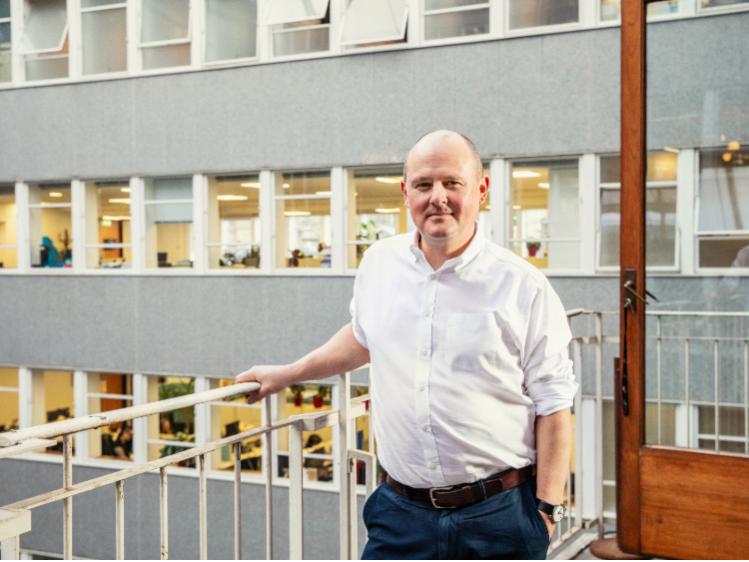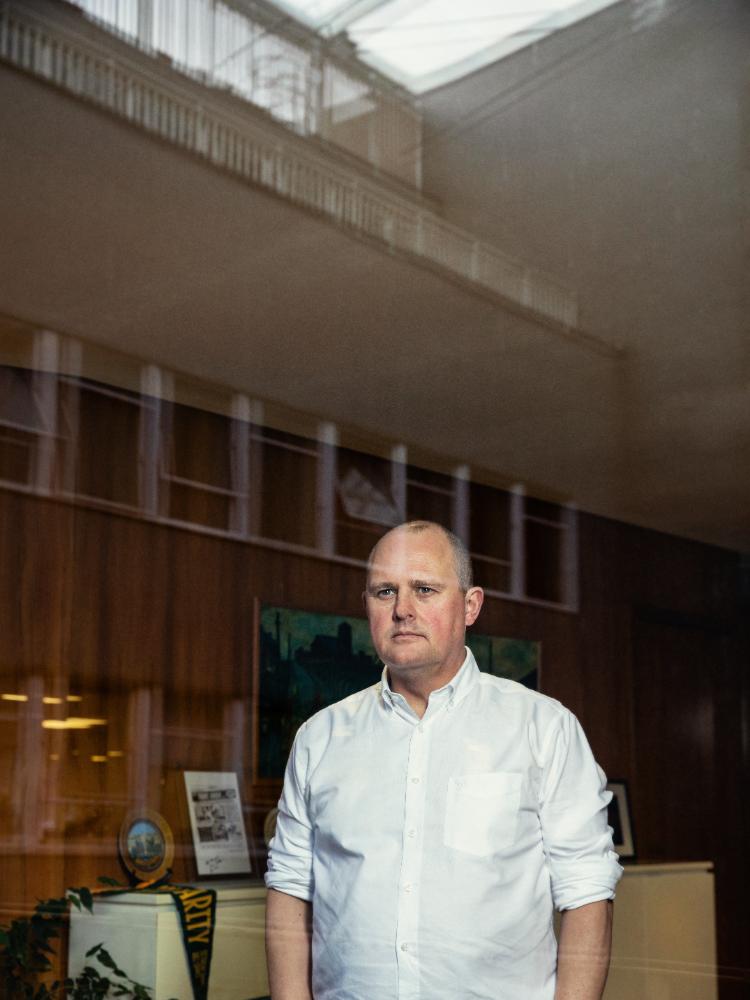'"Employment Rights Bill Lite" won't cut it': TUC's Paul Nowak
Paul Nowak (Photography: Louise Haywood-Schiefer)
9 min read
The Employment Rights Bill is facing further delays, yet TUC general secretary Paul Nowak tells Sophie Church he expects it to be delivered in full. Photography by Louise Haywood-Schiefer
Labour’s landmark employment rights package will soon be enshrined in law, but news of UK job losses in oil and gas keep coming. With Ed Miliband leading the push to reach ambitious net zero targets, Trades Union Congress (TUC) general secretary Paul Nowak admits there are “pressure points” with the Energy Secretary.
“Ed is delivering some really important initiatives,” Nowak tells The House, pointing to the “great potential” of new publicly owned company GB Energy, and the policy of giving skills passports to oil and gas workers who must move into renewable industries.
“That said, there are still going to be pressure points there. I think our unions that do represent people in oil and gas are right to challenge Ed and other ministers and government to say, ‘Okay, as we transition towards clean power by 2030, what does that actually practically mean for people working in oil and gas?’ Not just in terms of warm words about just transition – we want to see the concrete plans.”
Do I think Farage gives a toss about Port Talbot or the future of Britain’s industrial base? Absolutely not
Labour promising to protect workers while forging ahead with net-zero naturally invites contradiction. When Miliband attended a Westminster protest over the closure of Port Talbot steelworks, which saw 2,500 jobs lost, for instance, critics were quick to accuse Labour of hypocrisy.
Does the government’s weathervaning allow Reform UK to position itself as the party representing working people?
“Nigel Farage thinks this is another wedge issue. Do I think he gives a toss about Port Talbot or the future of Britain’s industrial base? Absolutely not. They’d see this purely through the lens of electoral advantage,” Nowak says.
“Once you scratch below the surface of whatever bandwagon Farage has jumped off, it’s the same old prescription of deregulation and opening up to the market. He doesn’t care about workers’ rights; he doesn’t care about quality employment.”
The union federation leader draws a contrast beween Farage’s politicking and Labour’s Employment Rights Bill, which he describes as “hugely popular with the public”. The legislation promises to clamp down on zero-hours contracts, give employees first-day rights and empower unions.
 Paul Nowak (Photography: Louise Haywood-Schiefer)
Paul Nowak (Photography: Louise Haywood-Schiefer)
However, repeated warnings from business that the bill jeopardises the government’s growth strategy has seen key measures weakened and the legislative process delayed. It has been reported that firms are now taking advantage of 40 ongoing consultations to delay the bill’s progress further.
Some union leaders have been left frustrated. Unite general secretary Sharon Graham told The House in September that business pressure was drawing the bill into a doom-spiral of “consultation and revision”.
Nowak, whose federation comprises 48 trade unions representing approximately 5.5 million workers, is clear that he expects there to be no further watering down of the measures.
“I’m confident that the bill is going to be delivered and delivered in full,” he says. “It’s really important that the legislation is fit for purpose, but I’m not getting into grim forebodings of what might happen.”
“‘Employment Rights Bill Lite’ won’t cut it for millions of people who are looking for positive change in workplaces,” he adds.
When asked whether the bill would stop another P&O Ferries style event – where nearly 800 employees were sacked on the spot – the TUC leader is confident that “the provisions around firing and rehiring in the bill will make it impossible for another P&O [Ferries] to happen”.
But with Deputy Prime Minister Angela Rayner, the face of the bill, promising a “pro-growth, pro-business and pro-worker” piece of legislation, is the government delusional about trying to please everyone?
“I think that the Employment Rights Bill will be good for the people that we represent, but it’d be good for the vast majority of employers in this country as well. We reckon it’s going to generate something like a £13bn net boost to the UK economy,” Nowak replies.
“There will be some additional costs for some employers, but overwhelmingly these will be additional costs that effectively take the risk off low-paid, insecure workers and put it back on their employers, which is where it should be.” The government’s own impact assessment has acknowledged the measures could cost employers up to £5bn a year.
As the bill enters report stage, Nowak thinks it vital that government, unions and employers remove its “fear factor” and make the case that “this is good for employers as well as good for employees”. From round tables with employers, unions, civil servants and ministers, he says there has already been “a lot of work done to make sure that the concerns of businesses are being taken on board”.
Nowak is also pushing for “practical things” to support business with the changes. “We’ll need more additional resource into organisations like [workplace advice service] Acas, for example, providing that practical guidance and support to employers.”
While he is hard-pushed to criticise the government – saying the “grown-up dialogue” of the current administration stands in stark contrast to the “internal psycho drama” of the last – he would like to see plans for sectoral bargaining extended.
Sectoral bargaining would give whole industries a chance to collectively reach agreements, rather than leave it individual firms. Labour is only applying this reform to social care, however.
 Paul Nowak (Photography: Louise Haywood-Schiefer)
Paul Nowak (Photography: Louise Haywood-Schiefer)
“We must focus on getting it right in adult social care,” employment rights minister Justin Madders said in the Chamber, “and we will see where that takes us.”
Nowak tells The House that sectoral bargaining would be useful “across other parts of the economy”.
“The OECD and the IMF have talked about the value of collective bargaining, particularly in the face of some of these big challenges around decarbonisation, AI and new technology,” he says.
“It addresses the fact that lots of employers have fragmented things like supply chains in a deliberate attempt to avoid their employment responsibilities. Sectoral collective bargaining actually sets again a level playing field for employers.”
Growth at all costs has seen Labour embrace a doveish attitude to China, with Keir Starmer the first Prime Minister in six years to visit the country. Chancellor Rachel Reeves secured £600m for the UK over the next five years on a recent visit to Beijing.
With reports of the UK importing goods made through forced labour, does Nowak worry we are galvanising worker exploitation abroad?
“I do actually think that the government is going to have to navigate a new relationship with China,” he says, revealing that the TUC has conferred with international union partners on how to deal with China.
The same conversation has not yet happened with government, but it is one the TUC is “keen to open up”.
With China experiencing its own ‘Sputnik moment’ with artificial intelligence-powered chatbot DeepSeek, the prospect of technology replacing jobs comes one step closer. However, Nowak says it is not losing their jobs his members fear but the employers who could use technology to stamp down on worker freedoms.
 Paul Nowak (Photography: Louise Haywood-Schiefer)
Paul Nowak (Photography: Louise Haywood-Schiefer)
“We’ve had concerns from members – not so much about job replacement directly – but about things like intrusive management surveillance. That sense that the algorithms are determining you’re not working hard enough, and then issue a warning.”
He points to the likes of Jeff Bezos and Elon Musk as examples of how the “digital dividend” from AI may find its way back into tech billionaires’ pockets, instead of funding public services.
“Jeff Bezos typifies what’s wrong with modern capitalism. We saw this hyper-exploitation, the digital dividend, which is allowing him to compete with his fellow tech billionaires about who can send the most rockets into space,” he says. “It does throw up questions about: what does a fair system of tax look like in this new AI-driven world?”
Nowak says unions have “always been at their best” when they don’t just “respond” to new technology but “actively shape” its deployment.
Membership of TUC unions saw a “very modest increase” of around 90,000 members last year, he says, stressing that communication including via social media is key. Nowak recognises that this is an area in which the “populist right” excels.
“It’s about winning the air war. One thing you’ve got to give credit to the populist right for: they’ve managed to create a huge footprint on social media. There’s a challenge there for those of us who are on more progressive side of politics, and for unions to do exactly the same.
“I always say to our team, ‘I know it’s a win if my daughter, who’s in her mid-20s and works in the private sector, gets something that pops up on her TikTok ‘for you’ page’. Then I know that we’re cutting through.”
He adds: “I certainly want to see us as a movement growing, and not growing by tens of thousands but by hundreds of thousands of members each and every year.”
Nowak, 52, counts canal boats and his own brand of “indie-Liverpudlian-singer-songwriter” music-making among his hobbies. Would he consider some Ed Davey-style stunts to gain followers, on the canals perhaps?
“The Lib Dems did relatively well at the last election, but I’m not sure they’ve completely cut through. I am open to offers from I’m a Celebrity, or Strictly, or anywhere else though,” he laughs.
“Actually, the one that I really want to do is Bargain Hunt… I’m not sure the general council or our press team would let me do it. And I’m not sure I’d say if you’re reaching out to the next generation of union members Bargain Hunt is the vehicle!”
When Labour’s landmark employment rights reforms are finally delivered, trade unions will take their share of the glory. But with a government pressured to achieve growth at all costs, and the voice of business clamouring for attention, time will tell whether the labour movement has the power to push reforms further.
